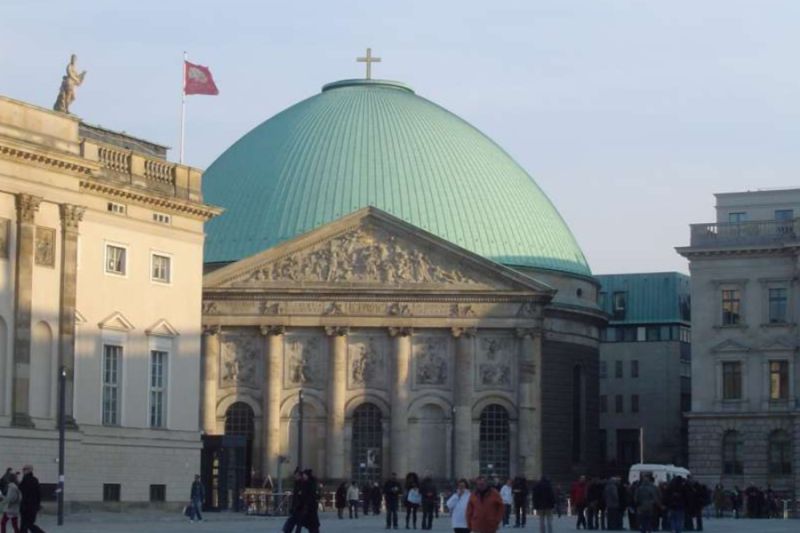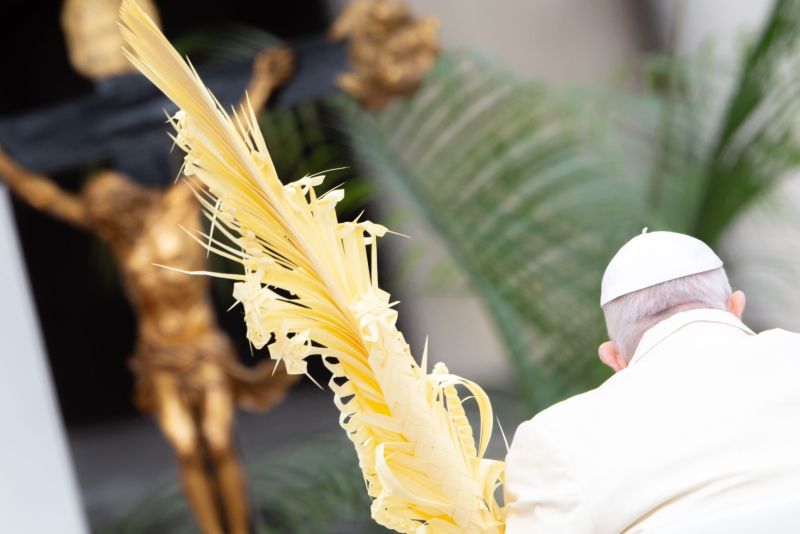
CNA Newsroom, Jun 19, 2023 / 16:40 pm (CNA).
Ahead of a crucial meeting on the German Synodal Way, one diocese has signaled its opposition to plans for turning the controversial event into a permanent Synodal Council — a new controlling body of the Church in Germany.
The official for the Synodal Way in the Diocese of Regensburg, cathedral chapter Josef Kreiml, warned that the preparatory work for a German Synodal Council contradicts a clear instruction from the Vatican, reported CNA Deutsch, CNA’s German-language news partner.
The prelate also said that the concept of synodality underlying the Synodal Way isn’t in line with either canon law or the ideas of Pope Francis.
The bishops of Germany’s 27 dioceses are expected to make landmark decisions at their meeting in Berlin on June 19-20 regarding the establishment and funding of the so-called Synodal Committee, which is to then establish a permanent German Synodal Council by 2026.
Some bishops had reportedly considered blocking the move by not providing funds for the body, which could prevent a permanent superstructure overseeing the Church in Germany modeled on the German Synodal Way.
The German Synodal Way was a multi-year process initiated by Cardinal Reinhard Marx and co-organized by the German Bishops’ Conference and the Central Committee of German Catholics (ZdK), a lay body financed by the German bishops. Its official purpose was to discuss four main issues: the way power is exercised in the church, sexual morality, the priesthood, and the role of women.
The process was criticized by many cardinals and bishops from around the world, as well as by Pope Francis, who warned of disunity and schism in his 2019 letter to German Catholics.
The Vatican has issued a statement saying that the Synodal Way does not have the authority to oblige bishops and the faithful to accept new forms of governance and new orientations in doctrine and morals.
Citing these statements, Kreiml said that the Synodal Way had greatly interfered with the forms of ecclesial governance and had disregarded the general law of the Church, its sacramental constitution, and the proper duties of the bishops.
He urged the German bishops to respect the unity of the Church and to follow papal guidance on synodality.
Pope Francis and other Church leaders have expressed serious concerns about plans to create a permanent synodal council for the German Church.
Such a body would function “as a consultative and decision-making body on essential developments in the Church and society,” according to a Synodal Way proposal.
More importantly, it would “make fundamental decisions of supra-diocesan significance on pastoral planning, questions of the future, and budgetary matters of the Church that are not decided at the diocesan level.”
Warning of a threat of a new schism from Germany, the Vatican already intervened in July 2022 against a German synodal council.
In January 2023, the Vatican asserted “that neither the Synodal Way, nor any body established by it, nor any bishops’ conference has the competence to establish the ‘synodal council’ at the national, diocesan, or parish level.”
A Soviet-style council in Berlin?
In June 2022, Cardinal Walter Kasper, a theologian considered close to Pope Francis, said there could be no Synodal Council, given Church history and theology.
“Synods cannot be institutionally made permanent. The tradition of the Church does not know a synodal Church government,” he said. “A synodal supreme council, as is now envisaged, has no basis in the entire history of the constitution. It would not be a renewal but an unheard-of innovation.”

The president emeritus of the Pontifical Council for Promoting Christian Unity, who was bishop of the Diocese of Rottenburg-Stuttgart from 1989 to 1999, said the German process had invited comparisons to communist structures in the Soviet Union. “It was a political scientist, not a theologian, who recently expressed this notion somewhat strongly, referring to such a Synodal Council as a Supreme Soviet,” Kasper said.
The cardinal continued: “‘Soviet’ is an old Russian word that means exactly what we call a ‘Rat,’ a council in German. Such a Supreme Soviet in the Church would obviously not be a good idea. Such a council system is not a Christian idea, but an idea coming from quite a different spirit or un-spirit.”
The German theologian and prelate also warned this “would choke off the freedom of the Spirit, which blows where and when it wants, and destroy the structure that Christ wanted for his Church.”
Further concerns were raised by a professor of theology from the University of Vienna in June.
The dogmatist Jan-Heiner Tück warned that a German Synodal Council would transfer leadership authority “from sacramentally ordained persons to bodies, a conversion of power that shows a clear closeness to synodal practices in the Protestant Church in Germany.”
If you value the news and views Catholic World Report provides, please consider donating to support our efforts. Your contribution will help us continue to make CWR available to all readers worldwide for free, without a subscription. Thank you for your generosity!
Click here for more information on donating to CWR. Click here to sign up for our newsletter.





Playing chess rather than checkers, one might well settle for a sacrificing a decoy perpetual council in Germany if the next move is the worldwide Synod on Synodality. In what way?
Well, St. John Paul II altered the conclave rules for selecting a pope to a conclave majority, in a bind; and Benedict then restored the long-standing two-thirds rule…and earlier rule under Pius XII was actually two-thirds-plus-one, to ensure that a candidate could not cast the deciding vote for himself.
The 2023 Synod on Synodality already has the melded clerical/lay structure, more-or-less transplanted from der Synodal Weg. Thinking chess, the next move is a pre-conclave maneuver in the selection of a successor pope…Why not enable the non-perpetual Synod on Synodality to influence the conclave selection by vetoing, ahead of the conclave, those papabili not acceptable to the progressive wing?
Perhaps only advisory, but also intimidating (as in the German record). Also, the veneer of custom and tradition, recalling the 11th-century Investiture Crisis–and recalling the residue which still had the 20th-century Franz Joseph, emperor of the Austro-Hungarian Empire (the Holy Roman Empire!), exercising his pre-conclave veto in 1914, and blocking the election of the leading candidate, Cardinal Secretary of State Rampolla. Such that Cardinal Sarto was elected on the seventh ballot and took the name Pius X.
The new twist is that in a new “inverted-pyramid” Church, the filtering action would be done not by an old-fashion monarch, but by a new-fashion synod/lay plebiscite. And likely with an opposite outcome. Chess, anybody?
Or, maybe just a dystopian thought experiment, with Edgar Allan Poe as “facilitator”: not the Holy Spirit, but a “stately raven” at my chamber door “perched and sat, that and nothing more.”
Didn’t someone state – assert – attest, that “synodality” is “constitutive of the Church”?
Cardinal Kasper is always opportune and uncomposed, I notice. If you rule out a structure to do the same things without a structure -what is that? “Constitutive”? I don’t know.
‘ The German theologian and prelate also warned this “would choke off the freedom of the Spirit, which blows where and when it wants, and destroy the structure that Christ wanted for his Church.” ‘